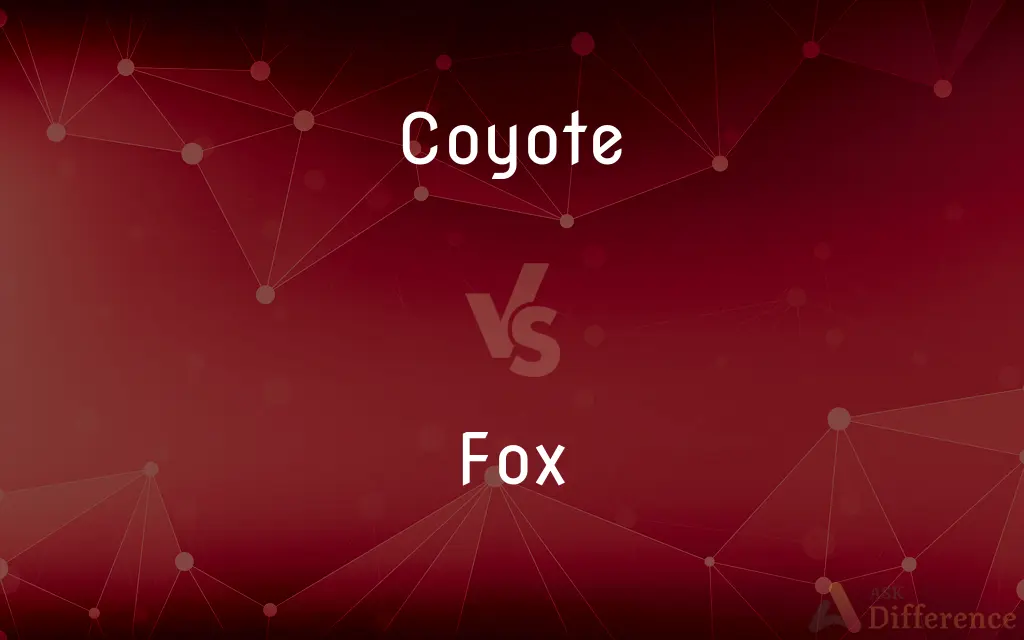Coyote vs. Fox — What's the Difference?
By Tayyaba Rehman — Updated on November 2, 2023
Coyotes are larger, more vocal canids found in North America, while foxes are smaller, more diverse in species, and widespread globally.

Difference Between Coyote and Fox
Table of Contents
ADVERTISEMENT
Key Differences
Coyotes (Canis latrans) are medium-sized canids native primarily to North America. They are known for their adaptability to various habitats, including urban areas, and their vocalizations, such as howls. Foxes, members of several genera of the Canidae family, are smaller than coyotes and are known for their cunning behavior in folklore. They inhabit diverse regions worldwide and have more varied diets.
Both animals are opportunistic feeders, but coyotes are larger and tend to hunt more substantial prey or scavenge as compared to foxes, which often feed on rodents, insects, and fruit. Coyotes also live in more open environments, whereas foxes can thrive in a wider range of habitats, from arctic tundras to deserts.
Socially, coyotes can form packs, which helps them take down larger prey. Foxes are more solitary, usually hunting and living alone or in small family groups. Coyotes have also been known to be more aggressive towards humans and pets, especially when in urban settings, while foxes are generally more secretive and avoidant.
In terms of vocalization, coyotes are much more vocal than foxes, using a complex system of yips, barks, and howls. Foxes do vocalize, particularly during the breeding season, but their sounds are less varied and not as loud as those of coyotes.
Finally, the presence of coyotes and foxes in culture varies significantly. Coyotes feature prominently in Native American mythology and the modern-day cartoon character Wile E. Coyote. Foxes, on the other hand, are found in folklore around the world, often characterized as clever and cunning tricksters.
ADVERTISEMENT
Comparison Chart
Size
Larger, up to 46 lbs (21 kg).
Smaller, up to 31 lbs (14 kg).
Distribution
Mainly North America.
Global, various species.
Habitat
Open grasslands, deserts, urban.
Forests, tundras, deserts, urban.
Social Structure
Packs or alone.
Solitary or small family groups.
Vocalization
Loud howls, yips, and barks.
High-pitched barks, screams.
Compare with Definitions
Coyote
A wild dog primarily found in North America.
The coyote howled under the moonlight.
Fox
A small, omnivorous mammal belonging to several genera.
The red fox slipped silently through the underbrush.
Coyote
Can form packs for hunting larger prey.
Coyotes often work together to bring down a deer.
Fox
Often depicted as sly in folklore.
The fox outsmarted the bear in the old fable.
Coyote
Features in Native American mythology.
The coyote is revered in many tribes as a figure of intelligence and craftiness.
Fox
Exists in various species across different continents.
The arctic fox changes its coat color with the seasons.
Coyote
Known for thriving in diverse habitats.
Urban expansion has led to increased coyote sightings in the city.
Fox
Foxes are small to medium-sized, omnivorous mammals belonging to several genera of the family Canidae. They have a flattened skull, upright triangular ears, a pointed, slightly upturned snout, and a long bushy tail (or brush).
Coyote
The coyote (Canis latrans) is a species of canine native to North America. It is smaller than its close relative, the wolf, and slightly smaller than the closely related eastern wolf and red wolf.
Fox
A member of a North American people formerly living in southern Wisconsin, and now mainly in Iowa, Nebraska, and Kansas.
Coyote
A wild dog that resembles the wolf, native to North America.
Fox
The Algonquian language of the Fox, now almost extinct.
Coyote
A person who smuggles people from Latin America across the US border, typically for a very high fee
At the bus station, there were coyotes offering to drive us to Los Angeles
Fox
Baffle or deceive (someone)
The abbreviation foxed me completely
Coyote
A wolflike carnivorous mammal (Canis latrans) of North and Central America, having grayish-brown or yellowish fur, large erect ears, and a drooping bushy tail. Also called prairie wolf.
Fox
Relating to the Fox or their language.
Coyote
A firefighter who is sent to battle remote, usually very severe forest fires, often for days at a time.
Fox
A member of a Native American people formerly inhabiting various parts of southern Michigan, southern Wisconsin, northern Illinois, and eastern Iowa, with present-day populations in central Iowa and with the Sauk in Oklahoma.
Coyote
(Slang) A person who smuggles undocumented immigrants into the United States, especially across the Mexican border.
Fox
The Algonquian language of the Fox.
Coyote
Canis latrans, a species of canine native to North America.
Fox
Any of various carnivorous mammals of the family Canidae and especially of the genus Vulpes, found worldwide and characteristically having upright ears, a pointed snout, and a long bushy tail.
Coyote
A smuggler of undocumented immigrants across the land border from Latin America into the United States of America.
Fox
The fur of one of these mammals.
Coyote
To prospect for gold by manually digging holes into overlying earth, as into a hillside.
Fox
A crafty, sly, or clever person.
Coyote
A carnivorous animal (Canis latrans), allied to the dog, found in the western part of North America; - called also prairie wolf. Its voice is a snapping bark, followed by a prolonged, shrill howl.
Fox
(Slang) A sexually attractive person.
Coyote
Small wolf native to western North America
Fox
(Nautical) Small cordage made by twisting together two or more strands of tarred yarn.
Coyote
Someone who smuggles illegal immigrants into the United States (usually acress the Mexican border)
Fox
(Archaic) A sword.
Coyote
A forest fire fighter who is sent to battle remote and severe forest fires (often for days at a time)
Fox
To trick or fool by ingenuity or cunning; outwit.
Coyote
An animal that hunts and scavenges for food.
A coyote was spotted rummaging through the campground.
Fox
To baffle or confuse.
Fox
To make (beer) sour by fermenting.
Fox
To repair (a shoe) by attaching a new upper.
Fox
(Obsolete) To intoxicate.
Fox
To act slyly or craftily.
Fox
To turn sour in fermenting. Used of beer.
Fox
A red fox, small carnivore (Vulpes vulpes), related to dogs and wolves, with red or silver fur and a bushy tail.
The quick brown fox jumps over the lazy dog.
Fox
Any of numerous species of small wild canids resembling the red fox. In the taxonomy they form the tribe Vulpini within the family Canidae, consisting of nine genera (see the Wikipedia article on the fox).
Fox
The fur of a fox.
Fox
A fox terrier.
Fox
The gemmeous dragonet, a fish, Callionymus lyra, so called from its yellow color.
Fox
A cunning person.
Fox
A physically attractive man or woman.
Fox
A person with reddish brown hair, usually a woman.
Fox
(nautical) A small strand of rope made by twisting several rope-yarns together. Used for seizings, mats, sennits, and gaskets.
Fox
(mechanics) A wedge driven into the split end of a bolt to tighten it.
Fox
A hidden radio transmitter, finding which is the goal of radiosport.
Fox
(cartomancy) The fourteenth Lenormand card.
Fox
(obsolete) A sword; so called from the stamp of a fox on the blade, or perhaps of a wolf taken for a fox.
Fox
Air-to-air weapon launched.
Fox
(transitive) To trick, fool or outwit (someone) by cunning or ingenuity.
Fox
(transitive) To confuse or baffle (someone).
This crossword puzzle has completely foxed me.
Fox
(intransitive) To act slyly or craftily.
Fox
(intransitive) To discolour paper. Fox marks are spots on paper caused by humidity. (See foxing.)
The pages of the book show distinct foxing.
Fox
(transitive) To make sour, as beer, by causing it to ferment.
Fox
(intransitive) To turn sour; said of beer, etc., when it sours in fermenting.
Fox
(transitive) To intoxicate; to stupefy with drink.
Fox
(transitive) To repair (boots) with new front upper leather, or to piece the upper fronts of.
Fox
A carnivorous animal of the genus Vulpes, family Canidæ, of many species. The European fox (V. vulgaris or V. vulpes), the American red fox (V. fulvus), the American gray fox (V. Virginianus), and the arctic, white, or blue, fox (V. lagopus) are well-known species.
Subtle as the fox for prey.
Fox
The European dragonet.
Fox
The fox shark or thrasher shark; - called also sea fox. See Thrasher shark, under Shark.
Fox
A sly, cunning fellow.
We call a crafty and cruel man a fox.
Fox
Rope yarn twisted together, and rubbed with tar; - used for seizings or mats.
Fox
A sword; - so called from the stamp of a fox on the blade, or perhaps of a wolf taken for a fox.
Thou diest on point of fox.
Fox
A tribe of Indians which, with the Sacs, formerly occupied the region about Green Bay, Wisconsin; - called also Outagamies.
Fox
To intoxicate; to stupefy with drink.
I drank . . . so much wine that I was almost foxed.
Fox
To make sour, as beer, by causing it to ferment.
Fox
To repair the feet of, as of boots, with new front upper leather, or to piece the upper fronts of.
Fox
To turn sour; - said of beer, etc., when it sours in fermenting.
Fox
Alert carnivorous mammal with pointed muzzle and ears and a bushy tail; most are predators that do not hunt in packs
Fox
A shifty deceptive person
Fox
The gray or reddish-brown fur of a fox
Fox
English statesman who supported American independence and the French Revolution (1749-1806)
Fox
English religious leader who founded the Society of Friends (1624-1691)
Fox
A member of an Algonquian people formerly living west of Lake Michigan along the Fox River
Fox
The Algonquian language of the Fox people
Fox
Deceive somebody;
We tricked the teacher into thinking that class would be cancelled next week
Fox
Be confusing or perplexing to; cause to be unable to think clearly;
These questions confuse even the experts
This question completely threw me
This question befuddled even the teacher
Fox
Become discolored with, or as if with, mildew spots
Fox
Typically hunts alone.
At dusk, a solitary fox prowled the meadow for mice.
Fox
Known for its thick, valuable fur.
Trappers once sought the fox for its soft pelt.
Common Curiosities
What do coyotes eat?
They are omnivores, eating meat and vegetation, including rodents, insects, fruit, and occasionally pets.
Can coyotes and foxes interbreed?
No, they are different genera and cannot interbreed.
Do coyotes live in urban areas like foxes?
Yes, both can adapt to urban environments but coyotes are more often seen in cities in North America.
What do foxes eat?
Foxes are also omnivorous, typically eating rodents, birds, insects, and fruit.
What are the habitat preferences of foxes?
Foxes have diverse habitat preferences, ranging from arctic regions to forests and urban areas.
What are the main physical differences between a coyote and a fox?
Coyotes are larger with a broader snout, while foxes are smaller with pointier faces.
Are coyotes dangerous to humans?
Coyotes rarely attack humans but can be a danger to pets and livestock.
Are foxes dangerous to humans?
Foxes usually avoid humans and are not considered a significant danger.
Do foxes hunt in packs?
No, they are generally solitary hunters.
Are foxes as vocal as coyotes?
Foxes are less vocal and have a narrower range of sounds compared to coyotes.
How long do coyotes live?
In the wild, coyotes live about 10 years, but can live longer in captivity.
Do coyotes hunt in packs?
They can hunt in packs or alone, depending on the prey and situation.
How long do foxes live?
Wild foxes live about 3 to 4 years on average, though this can be longer in captivity.
What are the habitat preferences of coyotes?
Coyotes prefer open areas like grasslands and deserts but are very adaptable.
How can you tell a coyote track from a fox track?
Coyote tracks are larger with less pronounced claw marks compared to the smaller, more discrete tracks of a fox.
Share Your Discovery

Previous Comparison
Elder vs. Alder
Next Comparison
Franticly vs. FranticallyAuthor Spotlight
Written by
Tayyaba RehmanTayyaba Rehman is a distinguished writer, currently serving as a primary contributor to askdifference.com. As a researcher in semantics and etymology, Tayyaba's passion for the complexity of languages and their distinctions has found a perfect home on the platform. Tayyaba delves into the intricacies of language, distinguishing between commonly confused words and phrases, thereby providing clarity for readers worldwide.
















































